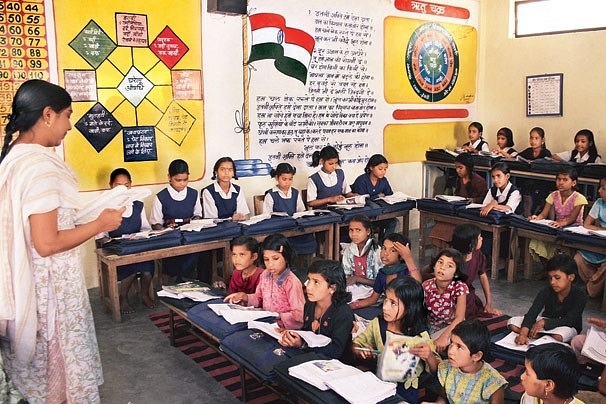News Brief
Union Cabinet Approves Rs 27,360 Crore Scheme To Provide High-Quality Education To Students Through 14,500 PM SHRI Schools

Students at a classroom in a government-run school (Representative Image)
Prime Minister Narendra Modi led Union Cabinet on Wednesday (7 September) approved a new centrally sponsored scheme for development of over 14,500 schools across India as PM SHRI Schools (PM ScHools for Rising India).
Under the scheme, selected schools being managed across the country by Central/state/UT governments as well as local bodies will be developed as PM Shri Schools.
PM SHRI Schools will showcase all components of the National Education Policy 2020, act as exemplar schools and also offer mentorship to other schools in their vicinity, according to a government release.
These schools will deliver quality teaching for the cognitive development of students and will strive to create and nurture holistic and well-rounded individuals equipped with key 21st century skills.
The scheme of PM SHRI schools will be implemented as a centrally sponsored scheme with a total project cost of Rs 27,360 crore which includes a central share of Rs 18,128 crore for the period of five years from year 2022-23 to 2026-27.
The key features of the PM SHRI Schools will be:
PM SHRI will provide high-quality education in an equitable, inclusive and joyful school environment that takes care of the diverse background, multilingual needs, and different academic abilities of children and makes them active participants in their own learning process as per the vision of NEP 2020.
PM SHRI Schools will provide leadership to other schools in their respective regions by providing mentorship.
The PM SHRI Schools will be developed as Green schools, incorporating environment friendly aspects like solar panels and LED lights, nutrition gardens with natural farming, waste management, plastic free, water conservation and harvesting, study of traditions/practices related to protection of environment, climate change related hackathon and awareness generation to adopt sustainable lifestyle.
Pedagogy adopted in these schools will be more experiential, holistic, integrated, play/toy-based (particularly, in the foundational years) inquiry-driven, discovery-oriented, learner-centred, discussion-based, flexible and enjoyable.
Focus will be on learning outcomes of every child in every grade. Assessment at all levels will be based on conceptual understanding and application of knowledge to real life situations and will be competency-based.
Assessment of the resources available and their effectiveness in terms of availability, adequacy, appropriateness, and utilisation for each of the domains and their key performance indicators will be done and gaps will be filled in a systematic and planned manner.
Linkage with Sector Skill Councils and local industry for enhancing employability and providing better employment opportunities will be explored.
A School Quality Assessment Framework (SQAF) is being developed, specifying the key performance indicators to measure outcomes. Quality evaluation of these schools at regular interval will be undertaken to ensure the desired standards.
Implementation strategy for PM SHRI Schools
PM SHRI Schools would be implemented through the existing administrative structure available for Samagra Shiksha, KVS and NVS. The other autonomous bodies would be involved on specific project basis as required.
These schools will be monitored vigorously to assess progress and understand the challenges faced in implementation of National Education Policy 2020.
Selection Methodology
Selection of PM SHRI schools will be done through Challenge Mode wherein Schools compete for support to become exemplar schools. Schools would be required to self-apply on the online portal.
The portal will be opened four times a year, once every quarter, for first two years of the scheme.
Maximum two schools (one Elementary and one secondary/senior secondary) would be selected per block/ULB (urban local body) with upper limit of number of total schools across India.
Geo-tagging of schools for the selection and monitoring of PM SHRI schools will be done.
The services of Bhaskaracharya National Institute for Space Applications and Geo-informatics (BISAG-N) will be taken for geo-tagging and other related tasks.
An Expert committee would be constituted for final selection of schools.
Support Swarajya's 50 Ground Reports Project & Sponsor A Story
Every general election Swarajya does a 50 ground reports project.
Aimed only at serious readers and those who appreciate the nuances of political undercurrents, the project provides a sense of India's electoral landscape. As you know, these reports are produced after considerable investment of travel, time and effort on the ground.
This time too we've kicked off the project in style and have covered over 30 constituencies already. If you're someone who appreciates such work and have enjoyed our coverage please consider sponsoring a ground report for just Rs 2999 to Rs 19,999 - it goes a long way in helping us produce more quality reportage.
You can also back this project by becoming a subscriber for as little as Rs 999 - so do click on this links and choose a plan that suits you and back us.
Click below to contribute.
Latest